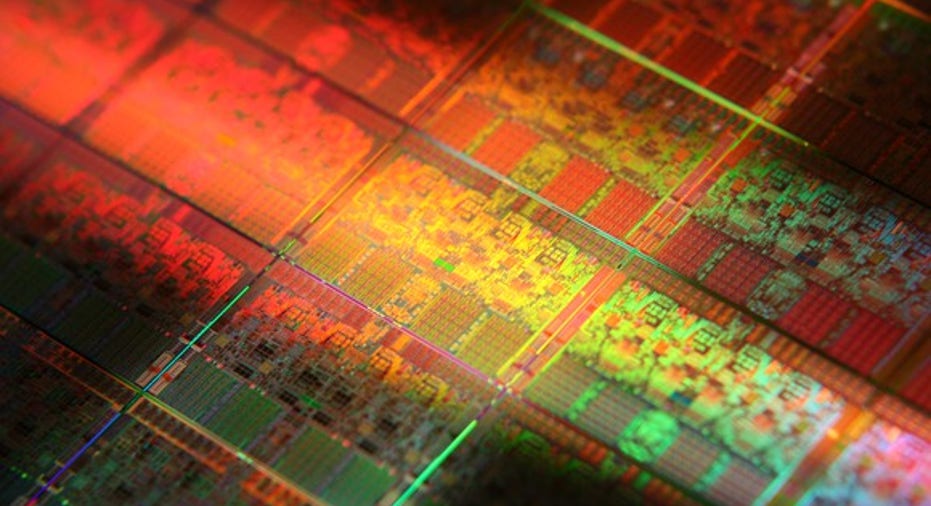Intel Corporation Is Preparing a Core i3 7350K Gaming Chip

Microprocessor giant Intel (NASDAQ: INTC) is expected to refresh its desktop personal computer processor lineup early next year with offerings based on its Kaby Lake architecture.
Image source: Intel.
Although these parts have yet to be formally announced, online retailer Bottom Line Telecommunications recently listed the various Kaby Lake-based desktop processors for pre-order (something first spotted by various tech press outlets). Most of the chips listed are direct replacements for the current generation Skylake processors, but there is at least one model that appears to be a new product -- the dual-core Core i3 7350K.
An unlocked Core i3 processor emerges
For years now, Intel has offered what it has called K versions of its desktop processors. These chips are based on the same designs as their non-K counterparts, but these chips can be run at higher speeds than what they are rated for by Intel.
This practice, known as overclocking, is not relevant to most PC users, but it is quite popular among gamers and other PC enthusiasts.
Intel had previously offered K versions of its Core i5 and Core i7 processors but not the Core i3 lineups.
The rationale behind such a product
Intel K processors tend to command slight premiums relative to their non-K counterparts. That premium is nice for Intel, because it doesn't cost the company any more to manufacture those chips, so margins on these products are a bit higher. Additionally, consumers are willing to pay for it, because they know that they can extract significantly more performance out of the chip via overclocking.
Additionally, Intel is specifying the Core i3 7350K to run at 4.2GHz speed out of the box -- modestly faster than the Core i3 7320 (also listed at Bottom Line Telecommunications) and its 4.1GHz rating.
Not only is Intel allowing users to run these K processors at higher speeds, the company also appears to be rating them at higher speeds from the get-go. This way, even users who have no intention of overclocking their processors may still want to pay the premium for these offerings due to their faster speeds straight out of the box.
This should boost average selling prices
I suspect that the reason that Intel held off on putting out unlocked Core i3 processors in the past was the concern that such chips would cannibalize sales of its higher-priced Core i5 processors. Indeed, many games still don't make good use of more than two processor cores, so a super-fast dual-core chip like the Core i3 7350K could be more desirable to gamers than a more expensive quad-core chip.
However, I suspect that Intel's marketing department concluded that people (including enthusiasts/gamers) are going to buy Core i3 processors anyway, so why not find a way to sell those same processors for more money, improving gross profit margin?
Additionally, since the Core i3 chips plug into the same motherboards as the Core i5 and Core i7 chips, Intel might be betting on buyers of the upcoming Core i3 7350K potentially upgrading to Core i5 or Core i7 processors down the line.
My guess is that the net effect of the Core i3 7350K launch will be a slight improvement in Intel's desktop processor average selling prices as a mix-shift up to the 7350K among gamers/PC enthusiasts more than offsets a slight cannibalization of Core i5 processor sales.
Forget the 2016 Election: 10 stocks we like better than Intel Donald Trump was just elected president, and volatility is up. But here's why you should ignore the election:
Investing geniuses Tom and David Gardner have spent a long time beating the market no matter who's in the White House. In fact, the newsletter they have run for over a decade, Motley Fool Stock Advisor, has tripled the market.*
David and Tom just revealed what they believe are the ten best stocks for investors to buy right now and Intel wasn't one of them! That's right -- they think these 10 stocks are even better buys.
Click here to learn about these picks!
*Stock Advisor returns as of November 7, 2016
Ashraf Eassa owns shares of Intel. The Motley Fool recommends Intel. Try any of our Foolish newsletter services free for 30 days. We Fools may not all hold the same opinions, but we all believe that considering a diverse range of insights makes us better investors. The Motley Fool has a disclosure policy.



















